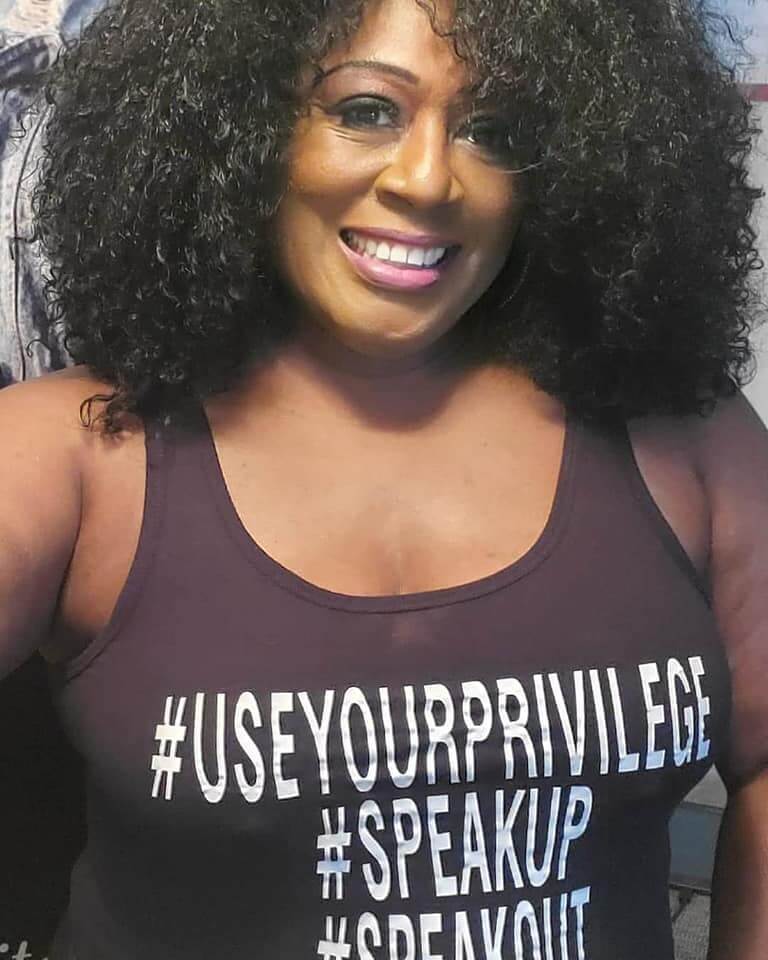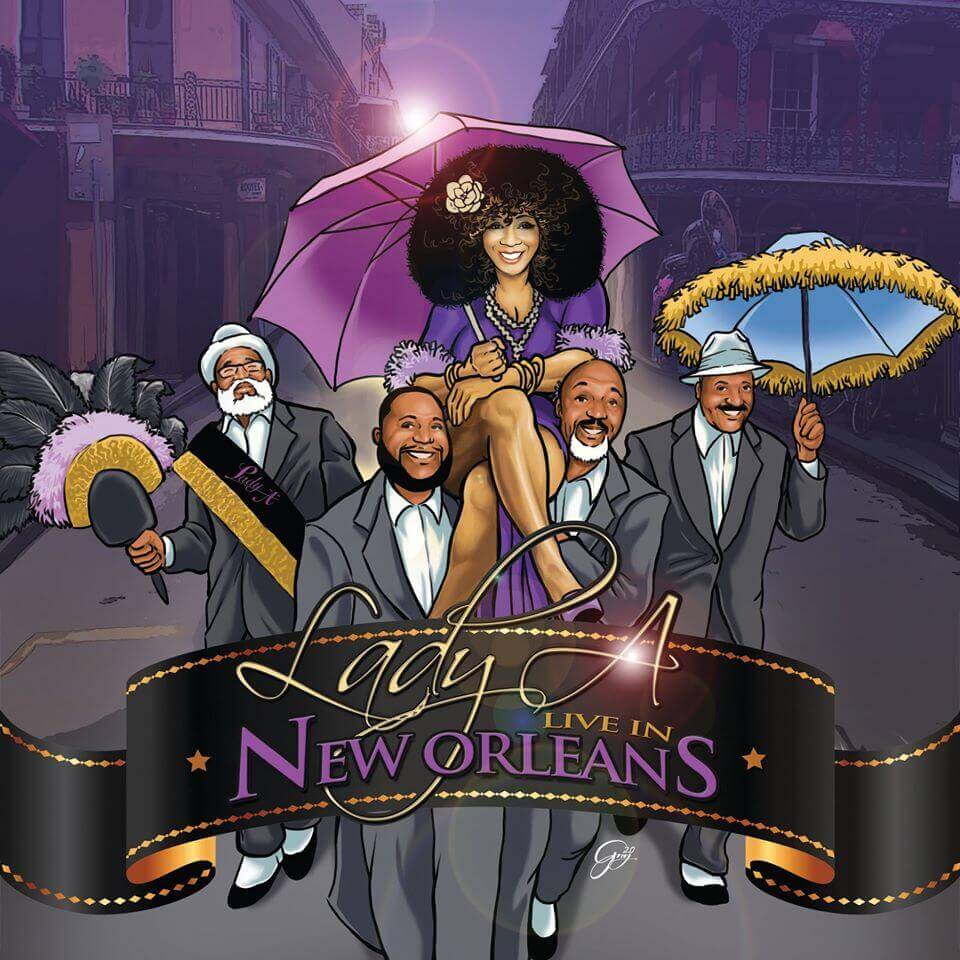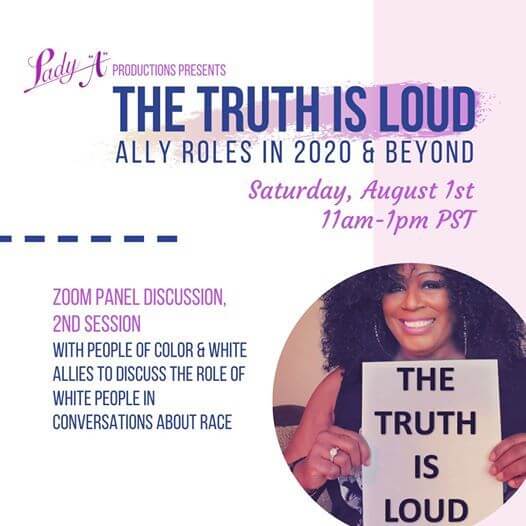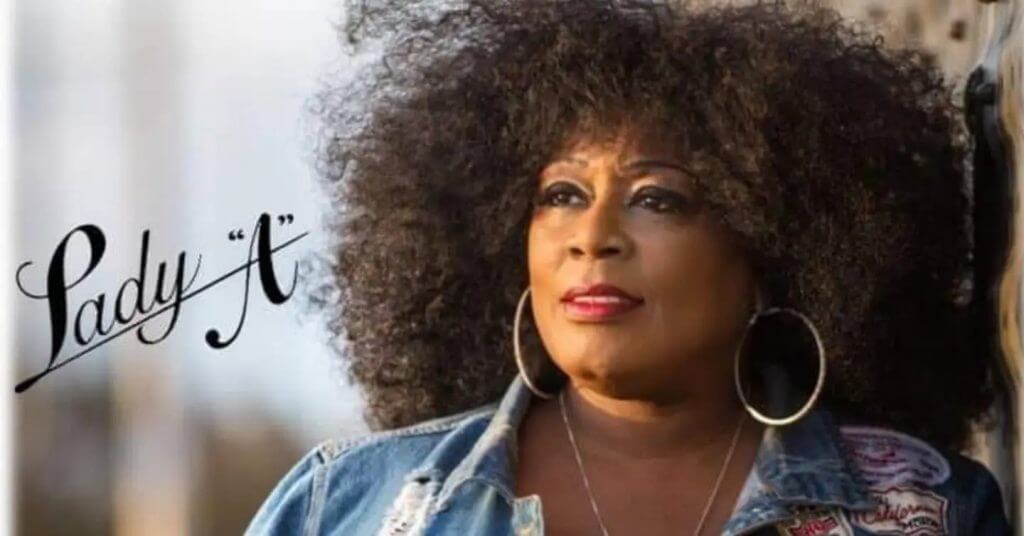In the weeks following the murder of George Floyd, a new era of Civil Rights began in this country. By that, I mean more people of color are demanding to be treated equally in all things, and more Caucasian people are allying themselves with that movement, or so it would seem.
One case in particular seems, on the surface, to be an example of a group becoming “woke” following the Black Lives Matter protests. They even credited that group with educating them on the racist implications of their name and moving them to change it. Problems arose when they chose a shortened version of their name which happened to be already in use by another artist. I’m speaking of course of Lady Antebellum, and their name change to Lady A.

Lady A is the name that Seattle-based blues, soul, funk and Gospel maven Anita White has been using for over three decades. It’s also a name she doesn’t want to give up. Who can blame her? Lady A has recorded and performed under that name since long before Lady Antebellum ever formed. The band’s move to change their name and the release of a song under the new moniker has effectively wiped the real Lady A off the map. When you search “Lady A” on the internet it’s the band that comes up, not the artist. Is this the action of an ally? Absolutely not.
“I don’t know why they’re digging their heels in,” Lady A says. “They made a statement about Black Lives Matter. Some people want to say that I’m the one that brought race into it, but I didn’t. Lady Antebellum did by putting out in their statement that Black Lives Matter, and in the wake of George Floyd, that their eyes were opened and their hearts were stirred with conviction. Changing their name from Lady Antebellum by shortening it to Lady A is still racist. I don’t know why they’re hanging on to that so much. Then finding out that I’m here and they still dig their heels in? That’s racist.”
This conflict is polarizing the music community, but not how one might think. A recent poll by Yahoo concluded that 71% of those surveyed (over 40,000) said that Lady Antebellum should NOT fight to keep the name Lady A. Some people will bring up that Lady A “has demanded” $10 million for the band to keep the name. That was never a demand, but rather one of several options that Lady A and her team came up with to either co-exist under one name, or sell them the name outright. The band has purportedly had a trademark on the name since 2010, however by using it professionally for decades, Lady A had established a Common Law trademark.
“I could see this unfolding during these talks and these text messages they were sending and I wasn’t having it,” Lady A declared. “I wanted to see what this coexistence looked like. What hurt me the most is that they dismissed me. They didn’t just dismiss me because I’m Black. They dismissed me because I’m a woman too, and because they don’t think I’m anybody. I’ve been in this business a long time.
“The only reason I can see why Lady Antebellum are digging their heels in is because they don’t believe what they said. If you’re going to be an ally, be ready to give up something. Their privilege has allowed them to think that they can come in and use their nickname, find out there is an artist named Lady A, and pretend they want to coexist. My question was then, and has always been ‘What does coexistence look like?’ Because as soon as they put something out as Lady A, they’re going to bury me on social media. Particularly on Amazon, iTunes and Spotify. I was very clear and asked that question three times. Not the lawyers, nor Lady Antebellum themselves would address me. It was almost as if I wasn’t in the room.”
“Lady Antebellum has sold over 10 million albums,” Lady A’s producer John Oliver III began. “So there’s Lady Antebellum the corporation and Lady Antebellum the artist. What I suggested was that Lady Antebellum bring Lady A under their management. Put her on their record label. Give her access to their resources so they can help rebrand her. That would answer the question, ‘how can we coexist?’ It happens in corporate America all the time. That was just one of the proposals we made.
“Lady A had been asking that question from the get-go. First she said, ‘I don’t want to share my name.’ But she is open to discussion. They said absolutely nothing. Bringing Lady A under their umbrella would have been a win-win for everybody. Remember Lady Antebellum came to Lady A with this news, trying to correct a mistake they had made. What they ended up doing was not only not correcting the mistake, but they started making multiple mistakes after that. They had good intentions but they didn’t follow through with them.”
“We also made other suggestions,” Lady A interjected. “Why don’t they be Lady A – The Band, and I’ll be Lady A – The Artist. I could see that as coexistence because then people would be intentional about what they typed in when they went to look for one of us. John kept saying you can’t have Lady A Apples and Lady A Apples in the same store. One of them isn’t going to get bought.
“I do work for racial and social justice every day on my day job. If you want to be an ally, I’m going to try and help. I was thinking country music and blues music coming together – here’s an opportunity. But they dangled this carrot of writing a song together in front of us as if we needed to eat. I don’t need them. They need me so they can appear woke. They want me to do this song and dance with them, make them appear to feel woke, not signing any contracts about how this supposed coexistence was going to work, then they could leave and go on about their business, which is what most white artists do to Black artists. They appropriate our music, appropriate our culture, and then they’re gone.”
Oliver continues, “They tried to manipulate the situation multiple ways. First, they tried to manipulate Lady A from the corporate side of Lady Antebellum. They had Hillary (Scott) on the phone crying. Those are tears of manipulation. When you’re truly sorry about something, you say ‘I’m sorry, and this what I’m going to do to correct it.’ Then they came in and tried to strong arm her with these coexistence agreements. Then we had a personal Zoom call with Lady Antebellum, the artists, where they tried to manipulate us using our belief in God against us. ‘God is love, and we should all love one another and get along.’ Love is love, but justice is justice. Then they wanted Lady A to do this song with them, but none of this was in the contract. They were trying to manipulate her into signing an agreement without any specifics drawn out. Not only did they get mad at Lady A for not signing the contract, but when she addressed them with some other options, they got mad at that too.”
“I want to let everyone know that my lawyers work for me, not the other way around,” Lady A says. “I had a lot of things going on at the same time. My community work, an upcoming panel, the release of my new album on my birthday, July 18th, and since they didn’t like any other options, I said I would take $5 million for myself. I will rebrand myself. That was after a lot of soul searching, because I would have to explain to the kids that I mentor, to my family, to my community, to the people who follow me, why all of a sudden I’m going to change my name. That’s an explanation I was not looking forward to. I said the other $5 million would be for charity. Some would go to Black Lives Matter since Lady Antebellum brought them up. Some would go the seniors and youth I work with in the Seattle area, and the rest would go to musicians all across the country who run into legal problems.”

Again, Lady Antebellum and their collective camp turned a deaf ear. They weren’t interested in taking Lady A under their management and label umbrellas. They weren’t interested in adding an addendum ie “the band” and “the artist” to their names. They really weren’t interested in paying Lady A $10 million to own the name outright. So their next move was to file suit against Lady A for use of the name.
“When they say I tried to extort money from them, that wasn’t extortion,” Lady A adds. “We were in a legal negotiation. Their first two contracts came back null and void, because they had no substance, and everything was for them, and nothing for me.”
“I even asked them how they would feel if the tables were turned,” Oliver added. “They didn’t answer that question any more than they had answered any of our others.”
“What did they do?” Lady A replied. “They did what their privilege allowed them to do which was go to Billboard magazine and say I tried to extort $10 million from them. How did we find that out? Billboard called my lawyer. Then, in the same breath, they sued me for the trademark. They’re not suing me for money. They’re suing me for the right for both of us to use the name. I am NOT having it.
“They are not going to use that name unless they come out and say, ‘Black lives DON’T matter.’ They do that, and they can keep the name. I’ll walk away. Come out publicly just like they did when this whole thing began because they’re not going to insult Black people, indigenous people of this land, and people of color. They’re not going to insult our intelligence. This is about more than just me. This is about all Black artists who have had something taken from them by white people who feel privileged. Again, it’s about their behavior and how they treat people.
“That’s like the Ku Klux Klan coming out and saying ‘we’re not that racist anymore, so we’re just going to call ourselves the KKK.’ Changing your name from Lady Antebellum to Lady A does not make you less racist. And remember it was Lady Antebellum who said their eyes were opened and their hearts were stirred with conviction. If that’s no longer true, I would respect them more if they just came out and told me the truth. ‘We made a faux pas. Black lives really don’t matter to us, so we’re going to keep the name Lady A.’ If they come out on national TV and say that, I’ll walk away.”
Lady A has received support from not only her fans, but from a bevy of other artists, including Nashville singer/songwriter Margo Price. On July 11th, in a televised live appearance on The Grand Ole Opry, Price name-checked the group Lady Antebellum before suggesting that the show should book White, whom she called “the real Lady A.” To put it bluntly, by making a statement like that in Nashville, Price put her career on the line.
“See, that’s bravery,” Lady A said. “She asked me to come sing at the Grand Ole Opry! That’s putting action behind your words. She went against everything you would think country music folks would do. This is the thing with allyship, White people need to start speaking up bravely. That’s what white allies do. I am so tired from the trauma that Black people see every single day. Police are murdering us in the streets and our children are watching it on television. We have allies out there. I’m all about bringing people together. The more we talk, the more we find out we have more in common.
“That’s part of the reason I wrote ‘The Truth is Loud’,” Lady A continued. “I wasn’t going to put that song out until next year but with everything that was going on in the wake of George Floyd, Sandra Bland, Eric Garner, I mean the list just continues to go on. How loud to Black people, indigenous people of this land, people of color, how loud do we really have to be before things change?

“So I kind of coincided that with my panel discussion, which is Lady A Presents The Truth is Loud. It’s time for white people to end racism. Black people can’t do it. The next Zoom conference is August 1st, and right now we have about 90 people signed up for that. For me it’s about conversation. White people don’t talk to their children about race the way Black parents do. I asked some of my friends, ‘Do you talk to your kids about race?’ and their answer is no. This is important because racism is a learned behavior. Privilege is a behavior. Children aren’t born being racist. You can put a bunch of kids in a play pen and they’ll all play together fine until an adult tells them not to.”


